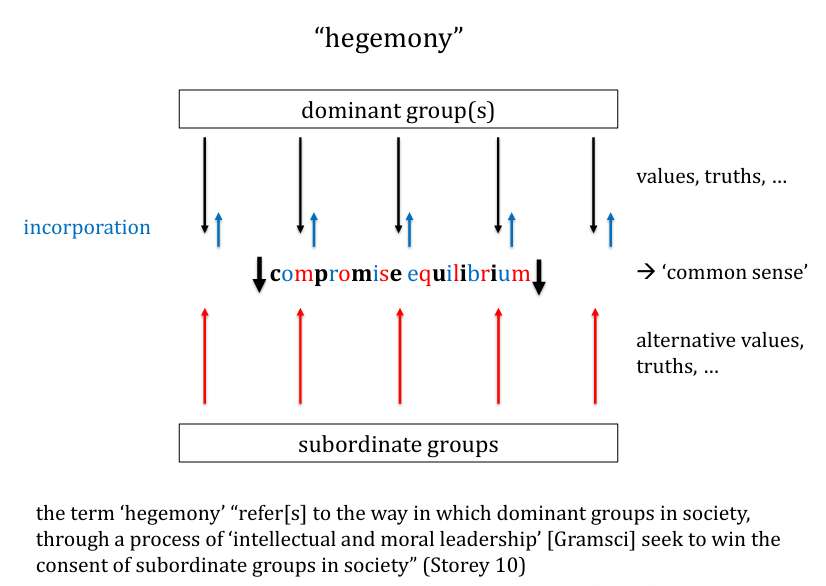Introduction to British Cultural Studies
1/28
There's no tags or description
Looks like no tags are added yet.
Name | Mastery | Learn | Test | Matching | Spaced |
|---|
No study sessions yet.
29 Terms
Culture
one of the two or three most complicated words in the English language
intricate historical development
important concepts in several distinct intellectual disciplines and in several distinct and incompatible systems of thought
Raymon Williams Culture
Culture as „a particular way of life“; „Culture is ordinary.“ (opposed to Arnold‘s understanding of culture as extraordinary)
Stuart Hall Cultural Studies
Central line of thinking in Cultural Studies, considered by some as the dominant paradigm.
Culture is interwoven with social practices and understood as sensuous human praxis through which history is made.
Defines culture as:
Meanings and values emerging among social groups/classes based on historical conditions and relationships.
Lived traditions and practices expressing and embodying these understandings.
Focus on experiential aspects and emphasis on creative and historical agency.
Highlights humanism through experience and agency.
Popular Culture and Ideology: Definition 1
Introduction of the concept of ideology highlights the connection between culture/ideology and power/politics
Indicates that popular culture is deeply influenced by power dynamics and political relations
Suggests that studying popular culture goes beyond analyzing entertainment and leisure
popular culture is simply culture that is widely favoured or well liked by many people
quantity
Popular Culture and Ideology: Definition 2
culture that is left over after we have decided what is high culture
popular culture: a “residual category”: “texts and practices that fail to meet the required standards to qualify as high culture” (5-6) → popular culture is “inferior culture”
high culture: requires some form of test (most often: test of “formal complexity”
knowledge of culture functions as a means to secure social exclusivity (6): notion of taste (= aesthetic judgement) → ‘cultural capital’ and ‘social capital’ complement each other (cultural and social capital are terms used by the French sociologist Pierre Bourdieu)
Popular Culture and Ideology: Definition 3
popular culture is ‘mass culture’
1) “popular culture is a hopelessly commercial culture.” (8)
2) “It is mass-produced for mass consumption.”
3) “Its audience is a mass of non-discriminating consumers. The culture itself is formulaic, manipulative (to the political right or left, depending on who is doing the analysis). It is a culture that is consumed with brain-numbed and brain-numbing passivity.”
→ mass culture as imposed from above / culture industries (i.e. the aspect of production is emphasised)
problematic aspects
1) studies have shown that we do not consume whatever is offered: many products fail
2) inherent nostalgia for a lost ‘Golden Age’: 2a) “a lost organic community” 2b) “a lost folk culture”
3) “mass culture is not just an imposed and impoverished culture – it is, in a clear identifiable sense, an imported American culture”: “Americanization” → yet: American culture has often acted as “a force of liberation”
”benign version” of mass-culture theory: popular culture as providing a “collective dream world”
Popular Culture and Ideology: Definition 4
popular culture as folk culture: a culture of the people for the people
top-down → bottom-up
Popular Culture and Ideology: Definition 5
popular culture refers to “a site of struggle between the ‘resistance’ of subordinate groups and the forces of ‘incorporation’ operating in the interests of the dominant groups.” → cultural hegemony
hegemony theory puts its focus on analysing “different types of conflict within and across popular culture”

Popular Culture and Ideology: Definition 6
postmodern culture is a culture that no longer recognizes the distinction between high and popular culture
this does not imply that there are no value judgments, but that the boundaries have become blurry (and the distinction becomes futile)
Storey‘s exampleof Pavarotti singing„NessunDorma“
Who decideswhat is ‚high‘ and what is ‚popular‘? Whoseideology? Does contextmatter? Isn‘t this rather about the exclusion of other things? 37 Dr. Piskurek, TU Dortmund
mindset translates into contrasting ways in which different cultural forms of expression are appreciated: a) popular culture: without any proper qualitative standard of ‘taste’ b) works of high culture as “the result of an individual act of creation” (6)
“The latter, therefore deserves a moral and aesthetic response; the former requires only a fleeting sociological inspection to unlock what little it has to offer.” (6)